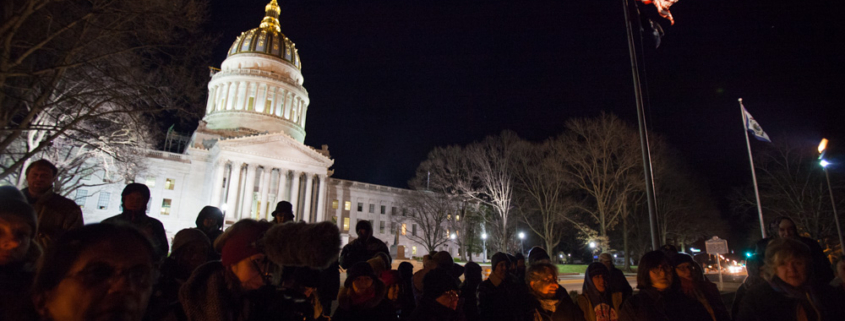Statements on the 6th Anniversary of the MCHM #WVWaterCrisis
January 8, 2019
Contact: Angie Rosser, arosser@wvrivers.org, 304-437-1274
Water Crisis 1-year anniversary remembrance January 2015. Photo by Keely Kernan.
Background
January 9, 2020 marks six years since the unfolding of what has become known as the West Virginia Water Crisis. At that time, MCHM, a coal-cleaning chemical, leaked from an aboveground storage tank at Freedom Industries into the Elk River, just upstream from West Virginia American Water’s intake, leaving about 300,000 residents in portions of nine central West Virginia counties without access to potable water for more than a week.
The crisis happened as the West Virginia Legislative Session was underway. Outraged citizens descended on the State Capitol to demand enforcement of existing laws and smarter regulations aimed at making polluting industries take better care of our vulnerable water resources.
Citizen pressure brought about some excellent new protections by the end of the 2014 Legislative Session. But, every year since, special interest lobbyists, working to increase the profit margins for their industries, have been hounding politicians to weaken those fundamental protections for our drinking water.
On the sixth anniversary of the MCHM water crisis and at the start of the 2020 West Virginia Legislative Session, clean, safe drinking water for every person living in West Virginia is still a goal rather than a reality. Legislation and regulations are in the works that could help restore and protect clean water—the most basic need for both human health and a strong economy.
One example is the pending introduction of the Clean Drinking Water Act, led by Delegate Evan Hansen and Senator William Ihlenfeld, which will take important first steps to identify, monitor and control the presence of toxic chemicals in our drinking water supplies. The legislation focuses on addressing risks from a group of chemicals known as polyfluoroalkyl substances, or “PFAS.” PFAS includes C-8, the chemical released by DuPont, which caused severe harm to West Virginians in the Parkersburg area. PFAS chemicals are man-made, persist and accumulate in the environment, and are known to cause cancer and other adverse health effects.
Statements from Leaders of Citizen Group
Angie Rosser, Executive Director, West Virginia Rivers Coalition: “MCHM is one example of the thousands of toxic chemicals threatening our drinking water that go unchecked. The West Virginia Legislature has an immediate opportunity to protect citizens from the risks of unregulated chemicals through passage of the Clean Drinking Water Act. Especially considering that West Virginia has some of the highest cancer rates in the country, it’s imperative to take action now to reduce the presence of cancer-causing chemicals in our water supplies.”
Linda Frame, President, West Virginia Environmental Council: “More than 300,000 of us will never forget where we were when we first learned our drinking water was poisoned. The 2014 chemical crisis was a life-changing event and an opportunity for state legislators to take a stand to protect us and our drinking water. Sadly, protections enacted in response to the crisis are gone, along with citizens who have left the state and businesses that have never recovered from the Freedom Industries disaster. Legislators can put us first by supporting the Clean Drinking Water Act to protect those of us who live here, instead of those who want a green light to poison our water even more.”
Vivian Stockman, Executive Director, OVEC – Ohio Valley Environmental Coalition:“Legislators who care know that access to clean water is essential for our families and communities. However, too many politicians are influenced by corporate polluters. The latest threat to clean water is from the proponents of the so-called Appalachian Storage and Trading Hub, or ASH—a buildout of a massive petrochemical/plastics industry here. Our drinking water is in the ASH crosshairs, and one bill to advance it would involve taxpayer money in a scheme for private gain—for out-of-country corporations! To defend our water, we must remember that democracy is not a spectator sport. Be sure to follow groups like West Virginia Environmental Council that alert you when you need to contact your legislators.”





